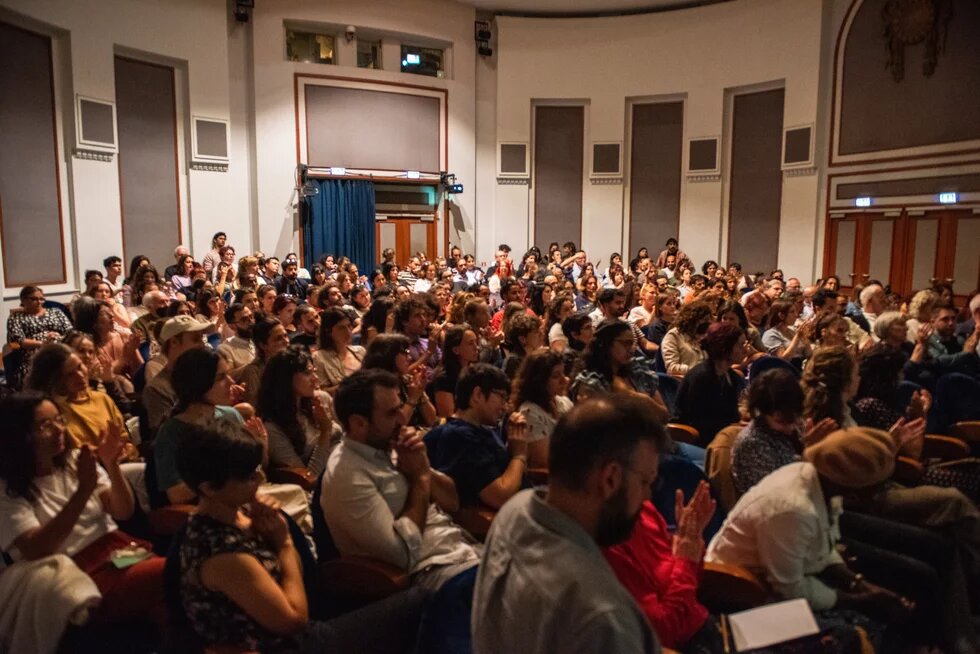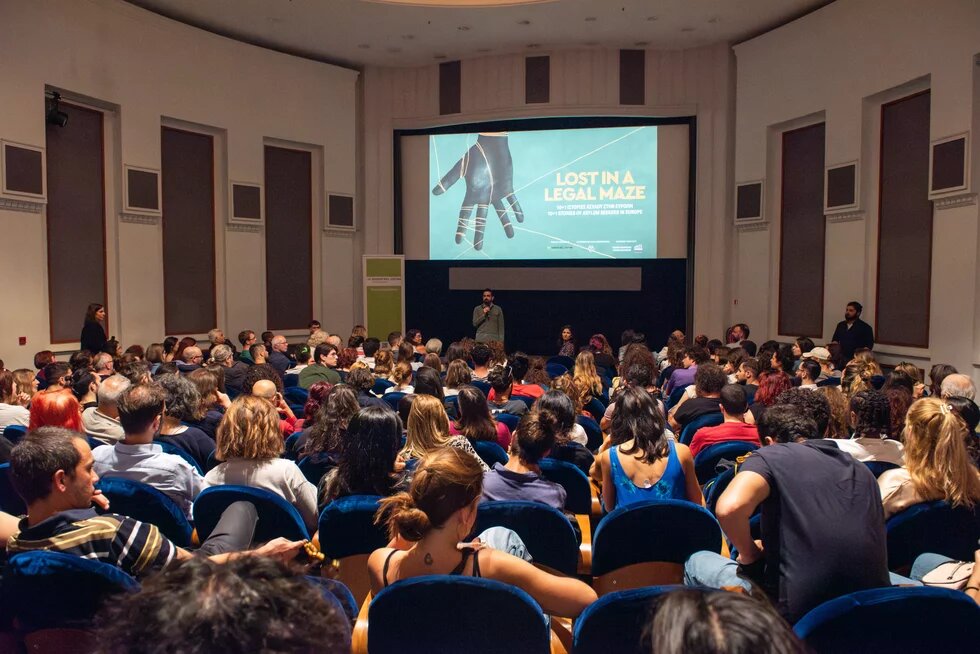
The video series “Lost in a legal maze”, which we created with Equal Legal Aid, explores – perhaps for the first time – the legal difficulties and the legal pitfalls faced by asylum seekers in Greece and Europe. Eleven people talk to the camera about their own cases, revealing with their testimonies the lack of coherence in asylum policy, the high degree of arbitrariness and a systematic attempt to discourage them. This article, on the occasion of the first screening of the series and the discussion that followed (13 May 2024, Thessaloniki), takes a legal and political look at these issues.

Simon fled to Europe in search of safety, but before he could seek protection, he was caught, he says, in crossfire during a push-back at the Greek-Turkish border. Νow he lives in a wheelchair waiting for the outcome of his asylum application.
“I want to walk again, if it is possible, and to fulfil my dreams. Sometimes I feel frustrated and broken because of my inability to walk and because everything in my life has changed,” he says on camera.
Simon and ten other refugees told their own legal journey in front of the camera – from rejections to unjustified refusals and retroactive laws.
The video series “Lost in a legal maze”, directed by Sideris Nanoudis, was created by the Heinrich Böll Foundation - Thessaloniki Office in cooperation with the non-governmental organization Equal Legal Aid (ELA). It was screened on 13 May 2024 in a packed hall of the Olympion Cinema in Thessaloniki.
“Things will most likely worsen, rather than improve”
“While these videos show the legal maze in which asylum seekers get lost here in Greece, it is important to be aware that such obstacles, people have to face seeking protection, are a European issue. With view to the EU’s so-called pact on migration and asylum and the latest decision to reform the Common European Asylum System things will most likely worsen, rather than improve and therefor it is even more pertinent to monitor the situation at the EU’s external borders. With the reform, Member States will carry out border procedures, which will result in an increase of immigration detention and which will make it even more difficult to access asylum. The concept of the so-called save third country will be further enhanced and refugee protection will be further externalized outside the European Union. Therefore, the recently passed reform along with ongoing breaches of rule of law will make the commitment of organisations such as ELA and other human rights defender even more pertinent. The right to asylum is a fundamental right and a historical lesson learned in Europe, not a privilege that EU Member States can decide to grant or withhold,” explains Neda Noraie-Kia, Head of Migration Policy in Europe for the Heinrich Böll Foundation.
According to statistics published by the Ministry of Immigration and Asylum in Greece in the first quarter of 2024, 16,800 asylum applications were recorded, 27% of which concern minors, 53% from the age group 18 to 34 years and 20% from the age group 35 to 64 years. According to the same data, at first instance the percentage of applications accepted reaches 51%, while at second instance the percentage is only 5.1%. In total, 468,325 asylum applications have been filed in Greece since 2013.
“Let's tear down this wall of silence”
The lawyers of the organisation are confronted every day with the harsh realities of seeking asylum in Europe and they are witnessing the deterioration of living conditions and the increasing difficulty of asylum procedures. As they report, “asylum seekers, trapped in isolated camps, are presented as a faceless and threatening mass, deprived of a voice and this enforced silence leads to their erasure from the public sphere and our societies”.
“They are not just 'migrants', but people we work with and talk to every day, and this complete invisibilisation and disempowerment is unbearable for us. In this sense, this project was very close to our hearts. We wanted to stand with them in breaking down this wall of silence, in opening up a space for their stories and experiences to exist. By reclaiming a piece of public space, they can regain control over their own narrative. These videos expose the Kafkaesque asylum procedures, the feeling of being trapped, of being stuck in limbo, the difficult path to asylum and safety, from their perspective.
These videos also aim to debunk stereotypes and shed light on the hardships faced by people in exile. The violations of the asylum procedure affect every asylum seeker in Europe. But these violations are also committed with total impunity, as asylum seekers have no means of holding states accountable.
To sum up, we wanted to raise the voice of those directly affected by these policies, and yet never consulted about them,” says Juliette Malfaisan, Executive Director and Founder of Equal Legal Aid, explaining the reasons for creating this series of videos.
As the members of the organisation note, the recent years have been devastating for the rights of asylum seekers in Greece. They complain that reception conditions have deteriorated, the non-profit sector has disintegrated and obstacles to asylum have multiplied. As they point out, the de facto detention of asylum seekers in unsanitary, overcrowded sites with no access to medical or psychosocial care is of particular concern and should be alerting.
Even when granted protection, refugees still face significant challenges in their integration, with difficulties accessing the labour market, health care, or educational programme.
“After depression comes madness”
Aisha, 44, suffers from serious health problems that cannot be treated in her country of origin and, as she says, she was forced to have her genitals amputated, a reason which in itself justifies the granting of asylum. However, her application for asylum has been rejected twice. “I live every day with the anxiety that any day now I will be returned to the same situation I escaped from. That’s what I keep thinking about. If your mental state is not strong, you fall into depression. After depression comes madness,” Aisha, who has been in Greece for the last six years, tells the camera. During the screening of the video she was in the cinema hall and wanted to address the audience. “I am here for those who cannot speak. Some have bigger problems than me,” the 44-year-old said and was applauded by the audience.
The system is literally engineered to fail
According to lawyers supporting refugees, asylum procedures in Greece have become increasingly complex, reaching a breaking point where the system is literally engineered to fail. Obstacles are now omnipresent at all stages of the asylum procedure.
They include:
- the extension of procedures allowing the authorities to reject an asylum claim without examining the merits of it, following a sham procedure,
- persistent difficulties in lodging an asylum application, leaving thousands of asylum seekers in limbo,
- the failure of the authorities to provide appropriate interpretation services during the asylum procedure,
- the failure of the authorities to recognise vulnerabilities and persecutions, despite clear evidence.
“The difficulties in accessing and being granted asylum have led to an increase in rejection decisions, with no possibility of return, either to a safe third country or to the country of origin. As a result, asylum seekers are often left in a legal limbo, without status, without papers and without shelter. This plunges them inexorably into precariousness, making them vulnerable to trafficking and abuse,” notes Juliette Malfaisan.
“We are constantly facing small obstacles which, when added up, form a big wall for these people”, says Athena Kalogridis, a lawyer for ELA. “One of the main problems is interpretation during the interviews in the asylum application process. Not all languages are adequately covered and several times people are effectively forced not to speak their mother tongue. People also do not have easy access to legal assistance and the quality of interviews, especially on the islands, is poor. Often they are short and no clarification is sought on the asylum seekers claims,” adds.
Legal nightmare
Zakariya describes on camera a legal nightmare he experienced with his two children. He had crossed into Greece in 2015 and then fled to Belgium where he applied for asylum and lived there legally. As he reported, during a visit to Thessaloniki in November 2017, he was kidnapped by masked men and taken with his children to the Greek-Turkish border. Black-clad men forced them to board a boat and drove them into Turkish territory. He lost all the official documents he had with him. He returned to Greece in 2019. His application for asylum in Greece was rejected as he had already been recognised as a refugee in Belgium. However, he also received a rejection decision from the Belgian authorities as he no longer had a residential address there. After the efforts of Greek and Belgian lawyers, in April 2024, Zakariya and his sons were allowed to return to Belgium.
“A situation of brutality at the border is being recorded. There are reports of 'kidnappings' of people and even murders. Nobody knows exactly what is happening at the border except the police and the army,” says Alexandros Tzenos, a lawyer at Equal Legal Aid.
Lawyers are concerned about the European Pact on Asylum and Migration, adopted by the European Parliament on 10 April 2024.
“From a human rights perspective represents a clear step backwards. The objective was to distribute the burden of migration more equitably and streamline asylum procedures. In fact, the provisions go much further than that. The pact enshrines at the European level some of the dissuasive measures already applied in Greece, with the potential for dramatic consequences. Indeed, Greece has been a pioneer in implementing one of Europe's most harmful migration policies. The refugee camps, constructed with European funding, have become a stark symbol of this approach. As an organisation, we are concerned to see the same pernicious tactics used in Southern Europe to impair the fundamental right to asylum, spreading across Europe and by the shrinking of civic space,” says Juliette Malfaisan.






